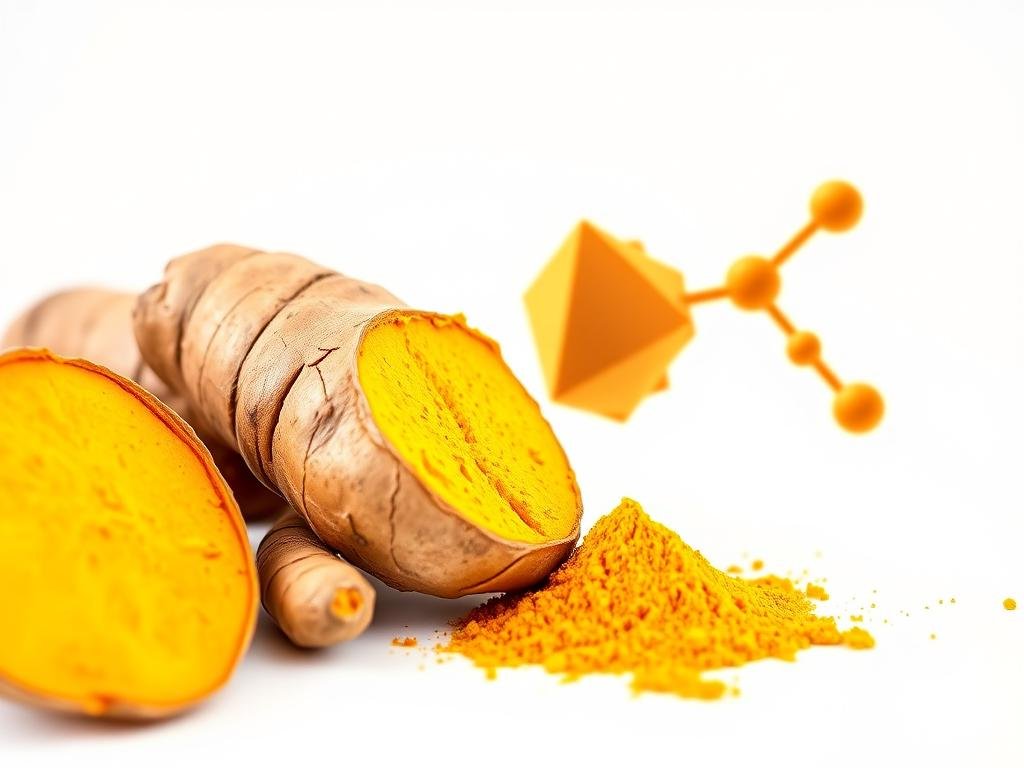Turmeric has gained significant popularity in weight loss circles, with many claiming it’s a miracle spice for burning belly fat. But does science support these claims? While turmeric contains beneficial compounds that may support weight management, the reality is more nuanced than many trendy articles suggest. This evidence-based analysis explores what research actually tells us about turmeric’s potential role in reducing abdominal fat.
Understanding Turmeric and Curcumin
Turmeric contains curcumin, the active compound responsible for many of its health benefits
Turmeric (Curcuma longa) is a bright yellow-orange spice that has been used for thousands of years in cooking and traditional medicine, particularly in India and Southeast Asia. The primary active compound in turmeric is curcumin, which gives the spice its vibrant color and is responsible for most of its potential health benefits.
Curcumin makes up only about 2-8% of turmeric by weight, which is important to understand when considering its effects on weight loss. This relatively low concentration means that consuming turmeric in food alone may not provide enough curcumin to see significant weight management benefits.
Curcumin’s Role in Metabolism and Fat Reduction
Research suggests that curcumin may influence several metabolic pathways related to fat storage and reduction. Understanding these mechanisms helps explain how turmeric might potentially affect belly fat.
Anti-inflammatory Effects
Chronic inflammation is closely linked to obesity and metabolic disorders. A 2019 review published in the Journal of Nutritional Biochemistry found that curcumin can suppress specific inflammatory markers that play a role in obesity. These markers are typically elevated in people with excess weight, particularly visceral (belly) fat.
Thermogenic Properties
Some research indicates that curcumin may have thermogenic properties, potentially increasing metabolic rate and enhancing fat burning. A 2018 study in the Journal of Nutritional Biochemistry demonstrated that curcumin supplementation increased energy expenditure in mice fed a high-fat diet.
Adipose Tissue Regulation

Curcumin appears to inhibit the formation of new fat cells (adipogenesis) and promote the breakdown of existing fat cells (lipolysis). A 2020 study published in Frontiers in Pharmacology found that curcumin supplementation reduced the size of fat cells and decreased overall fat accumulation in animal models.
Clinical Trials on Turmeric and Abdominal Fat
While laboratory and animal studies show promising results, human clinical trials provide the most relevant evidence for turmeric’s effects on belly fat. Here’s an analysis of three significant studies:
Study 1: Curcumin and Bioavailability
Study Design: Randomized, double-blind, placebo-controlled trial
Participants: 44 overweight adults
Duration: 30 days
Intervention: 1,000mg daily of bioavailable curcumin formulation vs. placebo
Key Findings:
- Significant reduction in waist circumference (average 2.1cm) in the curcumin group
- Decrease in body weight (average 1.88%) compared to placebo group
- Reduction in hip circumference and BMI
- Improved metabolic markers including blood glucose levels
Limitations: Short study duration, relatively small sample size, and use of a highly bioavailable curcumin formulation that may not represent typical supplements.
Study 2: Long-term Effects of Curcumin
Study Design: Randomized controlled trial
Participants: 87 subjects with metabolic syndrome
Duration: 8 weeks
Intervention: 1,500mg daily curcumin with piperine vs. placebo
Key Findings:
- Significant reduction in visceral fat area measured by CT scan
- Decreased waist circumference by an average of 3.1cm
- Improved insulin sensitivity
- Reduced inflammatory markers associated with obesity
Limitations: Results may not apply to healthy individuals without metabolic syndrome, and the addition of piperine makes it difficult to isolate curcumin’s specific effects.
Study 3: Curcumin Combined with Exercise
Study Design: Randomized controlled trial
Participants: 60 overweight adults
Duration: 12 weeks
Intervention: 800mg daily curcumin + moderate exercise vs. exercise alone vs. curcumin alone
Key Findings:
- Combined curcumin and exercise group showed greatest reduction in belly fat (4.2%)
- Exercise-only group showed 2.8% reduction in abdominal fat
- Curcumin-only group showed 1.6% reduction in abdominal fat
- Combined approach showed synergistic effects on metabolic markers
Limitations: Self-reported exercise compliance may have affected results, and the study did not control for dietary changes during the intervention period.

How to Use Turmeric for Weight Management
Based on the available research, here are evidence-based recommendations for incorporating turmeric into your weight management plan:
| Form | Recommended Daily Intake | Best Time to Take | Notes |
| Curcumin Supplements | 500-1,500mg | With meals containing fat | Look for formulations with piperine (black pepper extract) for better absorption |
| Turmeric Powder | 1-3 teaspoons (2,000-6,000mg) | Divided throughout the day | Contains only 2-8% curcumin; add black pepper to improve absorption |
| Fresh Turmeric Root | 1-3 inches | Anytime with meals | Grate into foods or juices; contains active enzymes not found in dried turmeric |
5 Turmeric Recipes for Weight Management

Golden Milk Latte
Combine 1 cup plant-based milk with 1 teaspoon turmeric, ¼ teaspoon black pepper, ½ teaspoon cinnamon, and a touch of honey. Heat gently and enjoy before bed to boost metabolism overnight.
Turmeric Smoothie Bowl
Blend 1 frozen banana, ½ cup mango, 1 teaspoon turmeric, ½ inch ginger, 1 tablespoon chia seeds, and almond milk. Top with berries and nuts for a filling breakfast.
Anti-Inflammatory Soup
Simmer vegetable broth with 1 tablespoon turmeric, garlic, ginger, vegetables, and lentils. This low-calorie, high-fiber soup helps reduce bloating and supports weight loss.
Turmeric Tea
Steep 1 teaspoon turmeric, ¼ teaspoon black pepper, lemon slice, and honey in hot water for 5-10 minutes. Drink 1-2 cups daily to support metabolism.
Turmeric Salad Dressing
Whisk olive oil, apple cider vinegar, 1 teaspoon turmeric, black pepper, and lemon juice. Use on salads to add fat-burning potential to your greens.
Bonus: Turmeric Fat-Burning Shot
Mix 1 tablespoon fresh turmeric juice, lemon juice, ginger, and a pinch of cayenne. Take this thermogenic shot in the morning to kickstart metabolism.
Warning: Potential Risks of Turmeric Overconsumption
While generally safe, excessive turmeric intake may cause:
- Digestive issues including nausea, diarrhea, and stomach pain
- Increased risk of kidney stones in predisposed individuals
- Potential iron absorption interference
- Blood thinning effects (avoid before surgery or if taking blood thinners)
- Possible liver stress with long-term high doses
Consult with a healthcare provider before starting any supplement regimen, especially if you have existing health conditions.
Debunking Common Myths About Turmeric and Fat Loss

Fact: Turmeric Supports Overall Weight Management
Scientific evidence suggests that curcumin can support weight management through multiple mechanisms, including reducing inflammation and improving metabolic markers. However, effects are modest and work best as part of a comprehensive approach.
Myth: Turmeric Directly Burns Belly Fat
No single food or supplement can “target” fat loss from specific body areas. While turmeric may support overall fat loss, the concept of spot reduction has been repeatedly disproven in scientific literature.
Fact: Turmeric Absorption Requires Special Considerations
Curcumin has poor bioavailability when consumed alone. Research shows that combining it with black pepper (which contains piperine) can increase absorption by up to 2,000%, making this combination essential for effectiveness.
Myth: Any Turmeric Supplement Will Work
Not all turmeric supplements are created equal. Many products contain insufficient curcumin concentrations or lack bioavailability enhancers. Quality, formulation, and dosage significantly impact potential benefits.
Fact: Results Require Consistency and Time
Clinical studies showing positive effects typically run for 8-12 weeks with daily supplementation. Expecting overnight results is unrealistic; consistent use alongside healthy lifestyle practices is necessary.
Myth: Turmeric Alone Is Enough for Weight Loss
Research clearly shows that turmeric works best when combined with other evidence-based approaches like caloric deficit, regular physical activity, adequate sleep, and stress management.
Ready to Try Quality Turmeric Supplements?
Based on our research, supplements containing 500-1500mg of curcumin with added black pepper extract (piperine) offer the best potential benefits for weight management support.
Frequently Asked Questions About Turmeric and Weight Loss

Is turmeric better with black pepper for weight loss?
Yes, absolutely. Curcumin (the active compound in turmeric) has very poor bioavailability when consumed alone. Piperine, the active compound in black pepper, can increase curcumin absorption by up to 2,000%. This is why almost all clinical studies showing positive weight management effects use formulations that combine curcumin with piperine or other bioavailability enhancers.
How long does it take to see results from turmeric for belly fat?
Based on clinical studies, noticeable effects typically require 8-12 weeks of consistent daily supplementation at appropriate doses (500-1500mg of curcumin). Individual results vary based on overall diet, activity level, genetics, and the specific formulation used. Remember that turmeric works best as part of a comprehensive approach to weight management rather than as a standalone solution.
What’s the best time to take turmeric for weight loss?
Curcumin is fat-soluble, meaning it’s best absorbed when taken with meals containing some healthy fats. While there’s no definitive “best” time, many researchers suggest taking turmeric supplements with breakfast or lunch to maximize potential metabolic benefits throughout the day. Some people report digestive discomfort when taking turmeric on an empty stomach, so taking it with food is generally recommended.
Can turmeric interact with medications for weight loss?
Yes, turmeric can interact with several medications. It may enhance the effects of blood thinners, affect blood sugar levels (potentially interacting with diabetes medications), and interact with certain antacids. If you’re taking prescription weight loss medications, blood pressure medications, or any other prescription drugs, consult with your healthcare provider before starting turmeric supplements to avoid potential interactions.
The Bottom Line: Does Turmeric Burn Belly Fat?

The evidence suggests that turmeric, specifically its active compound curcumin, may support overall weight management and potentially contribute to reducing belly fat when used consistently as part of a comprehensive approach. However, it’s not a magic solution for targeted fat loss.
The most promising research shows that curcumin may help by reducing inflammation, improving metabolic markers, and potentially enhancing the effects of diet and exercise. For best results:
- Choose high-quality supplements with enhanced bioavailability (containing piperine or other absorption enhancers)
- Use consistently for at least 8-12 weeks
- Combine with a balanced, calorie-appropriate diet
- Maintain regular physical activity, including both cardio and strength training
- Manage stress and prioritize adequate sleep
Remember that sustainable weight management comes from consistent healthy habits rather than any single supplement or food. Turmeric may be a helpful addition to your wellness toolkit, but it works best when supporting an already solid foundation of healthy lifestyle practices.
Disclaimer
This article is for informational purposes only and does not constitute medical advice. Always consult with a healthcare professional before starting any supplement regimen, especially if you have existing health conditions or take medications. Individual results may vary.
Want to Learn More About Natural Weight Management?
Discover our complete guide to evidence-based natural approaches for sustainable weight management and overall wellness.
YOU MAY ALSO LIKE: Tips to Lose Weight: Sustainable Lifestyle Changes











